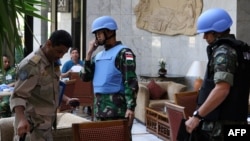UNITED NATIONS - The United Nations has deployed more than 200 unarmed observers to Syria who are monitoring a month-old cease-fire that appears to be in jeopardy of collapse. Increasingly, the U.N. monitors are getting caught up in the violence.
The U.N. Security Council has authorized a monitoring mission of 300 unarmed military observers to be on the ground in Syria for an initial period of only 90 days. The council has also demanded that they be given free movement in the country.
After a slow start, the mission is nearly fully deployed. But in recent days its convoys have had near-misses with roadside bombs raising questions about its ability to carry out its mandate effectively and keep its monitors safe.
U.N. Deputy Chief of Peacekeeping Edmond Mulet acknowledges the monitors are facing a very difficult situation on the ground. “They are there unarmed. There is no cease-fire. There is no peace agreement. There is no dialogue between the parties. There is urban warfare. And this is something we have never seen before. We have never placed our military observers in a situation like this," he said.
But he says despite obstacles the monitors are venturing out. “They are there to monitor a cease-fire and there is a violation of that cease-fire they have to report that, and this is what they are doing. They are reporting constantly about what they see and the attacks from one side to another, et cetera," he said.
While the Syrian government's shelling of towns has abated and there has been calm in some areas where the monitors have patrolled, they have been unable to convince both sides to cease the violence.
Richard Gowan, associate director of New York University’s Center on International Cooperation, says the observers are mainly there to open the way for the beginning of a political process. “U.N. officials are absolutely clear that this mission is a political token. It was deployed to try and create some space for the [Kofi] Annan plan to work; to act as a basis for talks between moderate opposition members and the government," he said.
Kofi Annan is the joint U.N.-Arab League envoy for Syria. He has been trying to mediate a political solution to the crisis, which is now in its 15th month and has seen more than 9,000 people killed. But so far neither side, government nor opposition, has come to the negotiating table.
Some diplomats and analysts have drawn comparisons to when the United Nations sent a force of thousands into Bosnia in 1992 to protect civilians. While the objects of the Bosnian and Syrian missions were different, both faced similar obstacles in that there was no cease-fire in place ahead of their deployment.
Richard Kauzlarich was U.S. Ambassador to Bosnia-Herzegovina in the late 1990s. He says one of the problems that plagued the Bosnian mission, known as UNPROFOR, was the parties’ unwillingness to stop fighting. “For whatever reasons, they saw war as the only solution to the political problem and UNPROFOR was given the impossible mission of trying to make peace in an environment where the people on the ground were not interested in peace," he said.
He says the United Nations may face a similar dilemma in Syria if the parties do not accept the U.N. as a presence to end the conflict and bring the government and the opposition to the negotiating table.
Mr. Annan has made it clear that the stakes are high. Last week he told the U.N. Security Council that although unacceptable human rights abuses continue and all aspects of his peace plan have not been implemented, there is no other option right now than the monitoring mission. “I also told members of the [Security] council that I believe that the U.N. supervision mission is possibly the only remaining chance to stabilize the country. And I am sure I am not telling you any secret, when I tell you that there is a profound concern that the country could otherwise descend into full civil war and the implications of that are quite frightening. We cannot allow that to happen," he said.
Given that dire assessment, there is reluctance to pull out the observers, despite the dangers. Security Council members say that the U.N. has no “Plan B” should the mission fail. So, Jeffrey Laurenti, a U.N. analyst with the Century Foundation, says the monitoring mission is likely to remain in Syria - for now. “It is a tough call on whether just to throw in towel or see this as the last best hope even if it is an ever dimming hope. I think right now the mood more generally in the international community would be to try to stick it out with them to see if this can in some way be a palliative; it is certainly not a cure," he said.
The crucial test will be whether the observers can help create the space for a political solution to the crisis. Otherwise, there is the danger that they will be trapped or simply police a crumbling cease-fire.
The Security Council will have to decide whether it makes sense to continue the mission in July when its 90-day mandate ends. Should the monitors be caught up in any more violence or become the target of attacks, that could strengthen doubts about whether the mission can help bring peace to Syria.




